AARP Hearing Center

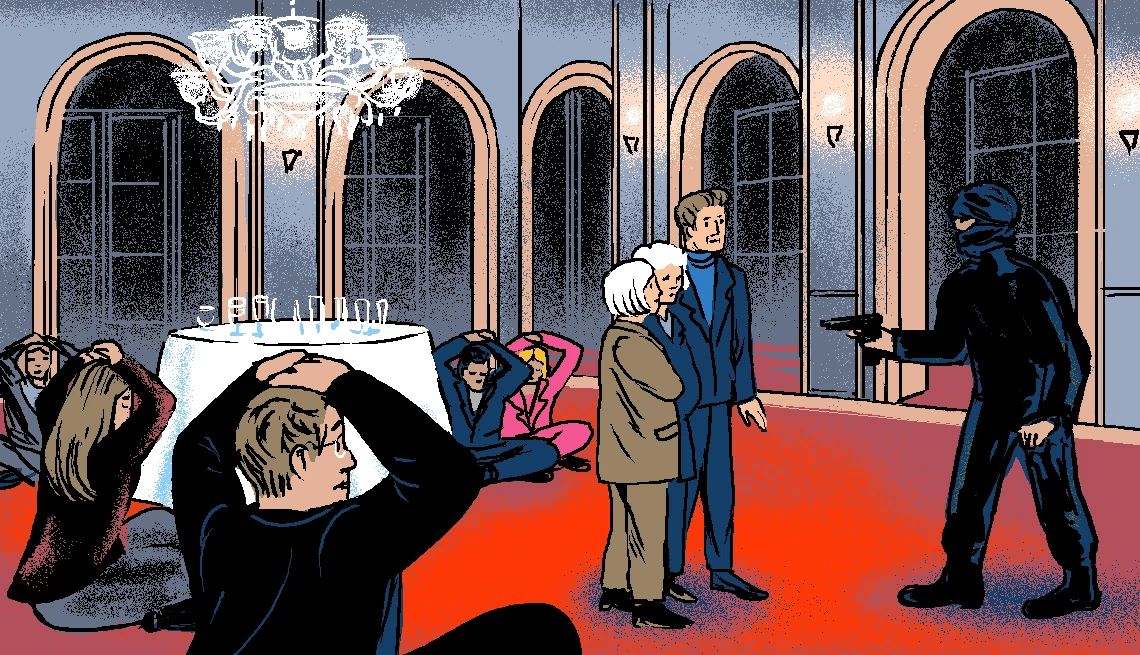
Chapter Thirty-Seven
With the ring halfway down her oesophagus and threatening to come back up, Penny allowed herself to be marched back into the auction house. What choice did she have? The young man had a gun, as did his two companions. It was an unwelcome eventuality that she had not planned for.
There was a surreal moment as the four of them—three gunmen and one nonagenarian in danger of choking on a priceless emerald—entered the grand salon together. The party guests continued to drink champagne and chatter. No one was watching what was happening at the door. The young man’s angry shout went unheard over the gossip and the valiant playing of the string quartet to which no one had been listening all evening.
“Right,” the gunman said. “Let’s do this.”


LIMITED TIME OFFER: Labor Day Sale!
Join AARP for just $9 per year with a 5-year membership and get a FREE Gift!
With his hand on Penny’s shoulder, he fired a single shot into the air to attract the party’s attention. It brought down half of an expensive 1960s Murano glass light fitting, which was thankfully hanging over a large table and not over anyone’s head. Even then, it was a second or two before anyone seemed to realise that the light fitting had been brought down deliberately.
“Ladies and gentlemen,” Penny’s captor announced over the hubbub. “May I have your attention, please. This is a siege and you are being taken hostage. Please sit down on the floor with your hands on your heads and nobody will be hurt.”
“Oh dear,” said Penny, as she thumped her chest to help the ring go down. It had been a long time since she’d swallowed anything so unyielding and she could hardly believe she’d ever done it. “Sit on the floor? I’m afraid I’m not sure I can manage that.”
Around the room, most people remained standing in confusion. What had the masked man said? they asked one another. Was this some sort of performance art specially put on for the party? Since the pandemic, masks had become so much a part of daily life that they no longer registered as sinister in quite the same way as they used to. It took another shot into the ceiling to really draw everyone’s attention.
“Floor. Now. Please,” the chief gunman commanded. “Hands on your heads.”
Slowly realising that this wasn’t a joke or the beginning of a witty art piece, the elegantly dressed guests started to lower themselves slowly to the parquet and arrange themselves cross-legged, like school children. Anyone who tried to slip away—and there were a couple—was swiftly blocked by the masked man’s accomplices, who had taken up a position by the main door. The auction house’s official security team were nowhere to be seen, having made their escape while the gunmen were pushing their way in. The security guards obviously had it clear in their minds which was the more valuable: their jobs or their lives. If any of the punters had brought their own security, they too were suddenly elsewhere.
“What’s going on?” came the murmur from every corner. “Who are these people?” The guests outnumbered the gunmen by a factor of a hundred but they allowed themselves to be subdued by the sight of the weapons, as well they might.
It wasn’t long before only three people apart from the gunmen remained standing. Penny wasn’t even trying to sit down. Archie stood alongside Josephine—who, like Penny, could not get down onto the floor on a whim—and Veronique, in her wheelchair. The young man who had been pushing Veronique’s chair was already on the floor. Archie still had Josephine’s treasured leftovers in his hand.
“Get down,” one of the two junior hostage-takers demanded. “That means all of you.”
“Would you mind?” Archie handed the plate of leftovers to Veronique, who cradled them in her lap. He then did his best to help Josephine to the floor but it was hopeless.
“I should never have given up yoga,” Josephine attempted a joke.
“You can’t expect these ladies to get down on the floor,” Archie told the chief gunman. “My great-aunts are ninety-seven and ninety-nine years old.”
“I don’t care. Sit down,” said the chief gunman.
“I definitely can’t,” said Penny. “I’ll never get back up.”
“Sit down.”
“They can’t sit on the floor. And I won’t sit down either,” said Archie. “Unless you allow me to get these ladies some chairs first.”
The chief gunman levelled the barrel of his gun at Archie.
“What?”
“Archie,” said Josephine. “I think we’ll just have to do as the young man asks.”
But it wasn’t happening. The entire room held its breath as Archie and Josephine performed a funny little dance that got her absolutely no closer to sitting cross-legged.
“Is this going to take long?” Penny asked the gunman.
“We’ll be here as long as we have to be.”
“Then we probably will need chairs.”
“What? Get them some chairs then,” the gunman barked at Archie. “But don’t try anything funny or I’ll blow this lady’s head off.”
He put the gun to Penny’s temple.
“Gosh,” said Penny. She gave Archie a little nod.
“One of the gilt ones,” she instructed. “The other ones are too low for my back.”
“Thank you,” said Archie to the gunman. He went to fetch two gilt chairs, apologising to his fellow hostages as he stepped over their legs.
“Excuse me. Sorry. Excuse me.”
“Archie,” Stéphane hissed at him from knee-height. “What are you doing? Be careful.”
“My great-aunts cannot sit on the floor,” said Archie, sounding a good deal braver than he felt in that moment. “I’m doing what I have to do.”
“Put the chairs on the stage,” the gunman instructed—motioning to the platform from which Stéphane had planned to give a charming speech at about this time. “Come on. Quickly.”
“Quickly really isn’t in my repertoire anymore,” Penny warned him. “And who are you again, dear? If we’re being kept hostage, I should really like to know why we’ve all been so unlucky.”
“Shut up,” was the only response she got.
“Manners cost nothing,” Penny muttered.
The gunman glared at her. Penny mimed pulling a zip across her mouth.
WHAT IS GOING ON? Penny asked herself. Was this a robbery gone wrong or something else?
Penny decided that if the masked men—though perhaps the smallest of the three was a woman—had been there simply to rob the auction house, they would have swiped the booty they were after and used their guns to clear a quick escape path, like the robbers who’d recently targeted the Chanel store on the Rue Cambon. They would have hoped not to have to involve any bystanders at all. They certainly wouldn’t have struck during a party, knowing there would be hundreds of people in attendance and security all over the place. So this was something different. Everything suggested an ideological motivation. Ideology was far more dangerous than greed. They weren’t taking jewels. They were taking hostages.
The gilt chairs were on the stage now. Archie settled Josephine in place then stepped down again to fetch Penny. The other hostages watched wide-eyed as Archie helped his great-aunt up the steps oh so carefully, as if they had all the time in the world.
The chief gunman barked his disapproval. “Come on!”
“We ’re moving as fast as we can,” said Penny, though the truth was, she could probably have moved a little faster. A lot faster. She wanted time to get the measure of the situation from a standing position. “Honestly, some people . . .”
As Archie helped Penny to her chair, he offered her some comforting thoughts.
“I don’t know what’s going on here, Auntie, but you’re not to worry. I’m sure this place is full of security cameras and the police must be fully aware of what’s happening and already be on their way. They’re probably outside right now, planning to rush in and end this nonsense at any moment.”
Archie was right that the auction house was full of security cameras, but as Penny looked for them—she thought she knew where all of them were—she wasn’t at all sure they were working. The ease with which the gunmen had entered the building perhaps even suggested an inside job, with the auction house’s security system disabled. She would have expected there to be a cacophony of alarms by now otherwise.
“Now get on the floor,” the chief gunman motioned for Archie to sit.
Flipping up the tails of his jacket so they didn’t get creased, Archie sat on the stage between his great-aunts’ feet, just as he’d done when he was small. Before he put his hands on his head, he gave them both the “thumbs up.” Then, correctly seated at last, he tapped out in Morse on his crown.
“Et well bi uk.”
He never could get the vowels right.
Up until that moment, Penny had remained quite sanguine, as her decades-old training allowed, but the sight of Archie’s bald patch—just like his father’s and his grandfather’s before that—as he mis-tapped his Morse was in danger of bringing a lump to her throat.
If only she’d just said, “Of course we should go” when he suggested they leave the party after Stéphane had introduced them to that lump of a fiancé. If only. But she’d had to get that cursed ring. Was the damn thing about to do its worst again?
With everyone seated, the hall was uncannily calm. The chattering was utterly silenced. The string quartet that had played so enthusiastically and determinedly over the chit-chat sat on the floor next to their chairs, with their instruments in their laps, and hands on their heads. Thus posed, the lead violinist was unable to stop her violin from slipping onto the parquet, where it landed with a strange clatter and twang. The chief gunman switched his attention to her, like a hawk spotting a mouse in long grass. But his gaze did not rest on her for long. He went back to sweeping the room in search of the real reason for this surreal interruption to one of the biggest social engagements of the year.
While his colleagues kept the hostages covered with their guns, the chief gunman set up a tripod. Then he took out his phone and took a panoramic shot of the room on video, before he settled the phone on the stand and began to talk directly into its camera lens.
“Good evening, Facebook. I’m not going to tell you my real name, but you may call me Angel, since I am here to bring retribution.”
A frisson went around the room. Retribution for what?
“I am a citizen of a state which has long since turned its back on democracy; where our esteemed leaders are nothing but robber barons. I am a fatherless child and a childless father. My family has been torn apart by quarrels that mean nothing to us, perpetrated on land that should have been used to feed our children, not to further enrich those who knew their loved ones would never have to stand on the front line.
“My apologies to you all,” he said to the auction house guests. “With the exception of you,” the masked man pointed his gun now at Dragomir Georgiev. “You know exactly who we are and why we’re here. To the rest of you, it is with great regret that I tell you this evening that because of this man and his associates back in my home country, some of you may die.”
There was an understandable murmur of distress.
The gunman addressed Georgiev directly. “Uncomfortable, isn’t it, to be on the wrong end of one of these? I believe this particular gun is one you supplied to the militia that stormed my village a couple of years ago.”
Georgiev looked hot and wretched in his Loro Piana dinner suit.
“Come up here, my old friend.”
Prodded in the back by another gunman, Georgiev got to his feet and reluctantly joined Archie and the sisters on the stage. “Tell these good people how you came to be among them? Tell them how you made your many, many millions? Don’t want to? I can understand why. Well, if you don’t want to talk, I’ll carry on.”
As Georgiev was forced to sit down on the stage next to the sisters, Angel looked into the camera of his phone again. “In exchange for the life of this man, and the rest of the innocent bystanders now trapped in this room, we require the release of the following political prisoners.”
He read out a list of names. At the end of the list, he told his audience, “We expect a response to our demands within half an hour and if that response doesn’t come, we will kill our first hostage. Every fifteen minutes after that, we’ll kill another one.”
“No!” someone shouted. “I have children.”
“So did I. Once upon a time.” Angel levelled his gun at the shouter.
The shouter looked down at the floor.
Angel turned back to his phone camera. “Now, we start the countdown to justice.” He glanced up at the clock on the auction house wall, as did everybody else.
“Kiip culm,” Archie tapped on his head in bad Morse.
AS IT WAS, Penny did feel quite calm again. Having heard Angel’s speech, she felt certain that he did not want this situation to end badly any more than his audience did. She remembered a long-ago lecture delivered by Frank during F Section training, about what to look for in recruiting partisans to a resistance cell. How to tell who would be a reliable colleague and who a dangerous hothead. She had a feeling that Angel was not the latter. Which wasn’t to say that they weren’t still in a difficult position. She wished she could send Archie a signal that reassured him, just as he was trying to reassure her. But he wouldn’t be able to see her tapping on her knee. Josephine could though. Penny tapped out “TG” for “toujours gai.” Josephine risked a little smile in her direction.
“Observe.” Penny heard Frank in her head.
There were instances when one needed to move quickly, on instinct, and instances when it was better to take the time to make a plan. Penny thought this was a situation for watching and waiting.
But while Penny was doing just that, down on the auction house floor, someone else decided to take action. Malcolm, Stéphane’s fiancé, suddenly scrambled to his feet and made a run for the door. He did not get far before he tripped over Dragomir Georgiev’s scantily-dressed girlfriend’s endless pins. As Malcolm was righting himself, the smallest of the gunmen was upon him. Malcolm flailed his arms and legs in what might have been taekwondo but looked like a total mess from where Penny was sitting. It was distracting but ineffectual. When the smallest gunman discharged a bullet into the ceiling, Malcolm dropped to the floor as though he ’d been hit. He hadn’t.
Malcolm got to his knees and put his hands together in prayer. “I can’t die!” he cried. “I can’t. I’m nothing to do with this.” He pointed at Georgiev. “I don’t even know who that man is. I’m just an actor. I come at everything in life from a place of truth and love.”
When Malcolm stood up again, Angel pointed his gun right at Malcolm’s head, causing the actor to pull one of the Brice-Petitjean assistants to her feet to use as a human shield. She squeaked in indignation.
“If you let me go,” Malcolm continued. “I can spread your message—whatever it is—in the outside world. I have fans, followers, millions of them. Just look at my Facebook page. I can be your mouthpiece. I’m playing a Resistance fighter in my latest film so I understand your struggle. Let me leave the building now and I will have a professional camera crew back here within the hour. I swear it. You can tell the whole world what your problem is then. My face will give you an international platform. You must know who I am?”
“I’m afraid I don’t,” Angel said, voice heavy with contempt. “Bring him up here.”
The young auction house assistant wriggled free of Malcolm’s unaffectionate embrace and the smaller gunman marched the actor up to the stage. “You might have won yourself a new role,” Angel told him. “As first man to die.”
Malcolm fell to his knees. “Nooo! I still have so much to give the world,” he wailed.
“The clock is ticking,” Angel addressed his phone. “Thirty minutes, or we begin to take reparations for Georgiev’s crimes. An eye for an eye. Starting with him . . .”
Malcolm sank onto his belly and beat his fists against the floor like a child having a tantrum. He railed against the gods and cried out for his mother. It was the most affecting performance he’d given in his twenty-year acting career. If only he were acting.
Penny wondered whether there was method in it. Was Malcolm distracting their captors before going for some kind of capoeira kick? Angel watched open-mouthed, as did everyone else. No daring martial arts move was forthcoming.
“Get up,” Angel told Malcolm. “I don’t want to have to shoot you in the back.”
“Noooo!” Malcolm rolled around like an upended beetle. “I can’t die. I’m at the height of my powers.”
“Ahem,” Archie cleared his throat to catch Angel’s attention. “What now?”
“Perhaps I could take Malcolm’s place?”
“No!” cried the sisters and a good half of the room.
“No,” said Angel. “No. Not you. I will spare this . . . this invertebrate.” Angel prodded Malcolm with his toe. “But I want his replacement to send a proper message about strength and bravery. So, worm, you can join the rest of our audience again, but only if you’re willing to swap your place with this little old lady.”
Angel swung his phone around and pointed the lens and his gun at Penny.
Malcolm could not get off the stage fast enough.
“Oh dear,” said Penny. “What a pickle.”
Chapter Thirty-Eight
1943
When Penny and Josephine spoke at history festivals up and down the UK, members of the audience would sometimes ask how they had lived through the war so unafraid. That was without even knowing what Penny’s war had really entailed. She would tell them in response, “I simply never for one moment thought that I was going to die.”
That wasn’t entirely true. There had been one moment when Penny very much did think she was going to die.
PARACHUTE TRAINING SPLIT the F Section recruits into two groups. Those who were excited about jumping from a plane and those who were quietly terrified. Penny was quietly terrified.
There were so many people one had to trust when it came to leaping from a plane. In the first place, you had to trust that the parachute had been properly made. Next you had to trust that the rigger who packed that parachute had not been having a bad day. You had to trust that the pilot of the plane that took you up would reach the right altitude over the right landing place. You had to trust that the person who had chosen the landing place knew what they were doing and wasn’t a double agent, waiting to hand you over to the Gestapo the moment you touched down. You had to trust that God would provide the right jumping conditions: a clear moonlit night with no crosswind. You had to trust that the parachute trainer had told you the right way to exit the hold. You had to trust that the dispatcher would pick the perfect moment to shout “Go.” Then you had to trust that your parachute would actually open.
Penny had never even been in a plane before her commando training with the SOE. Ahead of the first flight she ever took, from the south of England up to Arisaig, she stood trembling and silent as she waited for her turn to board. Though she understood something of the mechanics of flying, having read about it in one of her father’s library books, it was hard to believe that the physics would apply to this plane, the one she was about to go up in. It looked so heavy and that was before the candidates and all their kit were loaded on board. Penny desperately wanted to ask one of her fellow trainees to reassure her that planes just like this one made safe flights all the time, but that would only be construed as weakness, and weakness was not something for which she wanted to be known.
Jerome was sitting opposite her in the hold.
“Happy?” he asked her. “You’re looking awfully green.”
“It’s the uniform,” Penny snapped back. “Khaki really isn’t my colour.”
The laughter of the others, which told Penny she’d won the point, gave her enough of a boost to make it through take-off. Even Jerome had to smile.
All the same, she could not quite shake the thought that they might run out of oxygen as the plane climbed into the sky. And the landing was terrifying. She was convinced that the pilot would never be able bring the plane to a stop. Evidently, the landing was not as smooth as it might have been and she wasn’t the only one looking a little unwell as they filed off.
A month later, her paramilitary course complete, Penny was sent to Tatton Park near Manchester in preparation for her first parachute jump. Initial training took place in a hangar, from a tall tower built specially for the purpose, on which they could learn both how to exit a plane and land correctly. What nobody had told Penny was that jumping from that tower was, in many ways, harder than jumping from an actual plane. Once you were off the edge of the platform, it was a helluva rush to the ground. Penny would have volunteered for another round of having her head dunked in ice water in an instant if it meant she could avoid that leap.
And all the time Jerome seemed to be watching, waiting for her to make a mistake he could point out to the other candidates with glee.
“Get on with it, Bo Peep,” he shouted from the ground, as Penny perched above him on the edge of the platform’s trapdoor, the “Joe hole” as Jerome and his fellow Americans called it. Joe hole was slang for an outdoor toilet. Jerome’s goading made Penny angry enough to do it, to face that drop—much too short—and the sickening sensation of being jerked to a standstill in mid-air.
After that, the trainees were taken outdoors to the airstrip and loaded into an enormous wicker basket that was lifted into the air by a barrage balloon. The trainers remained on the ground, bellowing their instructions up into the sky through a megaphone. The basket was supposed to simulate the hold of a plane. When your number was called, you shuffled to the basket’s Joe hole, dropped your legs through and waited for go. When it was Penny’s turn, her trainer shouted, “Remember what your mother always said and keep your knees and feet together!”
Penny tipped him a sarcastic salute.
It seemed like an age between that “go” and the opening of Penny’s chute but she executed a textbook landing and made sure she was safely out of sight before covering her face with her hands to stave off a small panic attack.
Less than a week later, as the veteran of three real parachute jumps, Penny was ready for the all-important night jump. She got on board the Halifax that would take them up and took her seat without even pausing in her conversation with the next agent in training. She even found a moment to reapply her lipstick.
When the time came for her to jump, she took her place at the Joe hole and looked down at the darkened countryside flying by beneath them. Where once she had been too nervous to look out of a plane window, now she happily searched out landmarks as they whizzed by below. She was relieved that she had managed to get through that particular fear.
Earlier that day, the trainees had been talking about another female agent, who’d exited the plane clumsily and caught her head on the edge of the hatch on her way out. They called it “ringing the bell,” misjudging your exit from the plane like that. The agent (whom Penny would come to know of years later as Violette Szabo) was lucky that the damage she sustained was superficial. She still went on to undertake her mission. Now for some reason, she popped into Penny’s head just as she moved forward to take her own jump.
Penny had already made three perfect jumps from a bomber. Each one she’d enjoyed more than the last. Now she made her fourth jump, and this time she was the clapper . . .
For a second Penny thought she had been shot in the side of the head. As her parachute unfurled like a beautiful chrysanthemum above her head, she gazed up at the billowing silk, lit by the moon, in a daze. When the parachute was fully filled, it jerked her briefly upwards, then she continued a more stately fall. She was unconscious by the time she hit the earth.
It wasn’t such a bad thing, landing in a faint. Penny did not resist the ground as she made contact. Instead, she crumpled gracefully and probably hurt herself far less badly than she might have done had she been awake and panicking.
The drop zone team were there the moment she touched down, quickly getting her free of the parachute and rolling her onto her back, checking she was breathing and assessing her for damage.
“Get the stretcher,” she heard someone say.
“What happened?” someone else asked.
“She rang the fucking bell,” said Jerome.
“Fuck, what a mess.”
Penny thought she recognised that voice. Was it Frank? Opening her eyes, she strained to reach a hand towards his face.
“Frank,” she said. “I love you, Frank. Do you love me?”
“Frank?” mused Jerome.
“She’s concussed,” the parachute trainer said.

































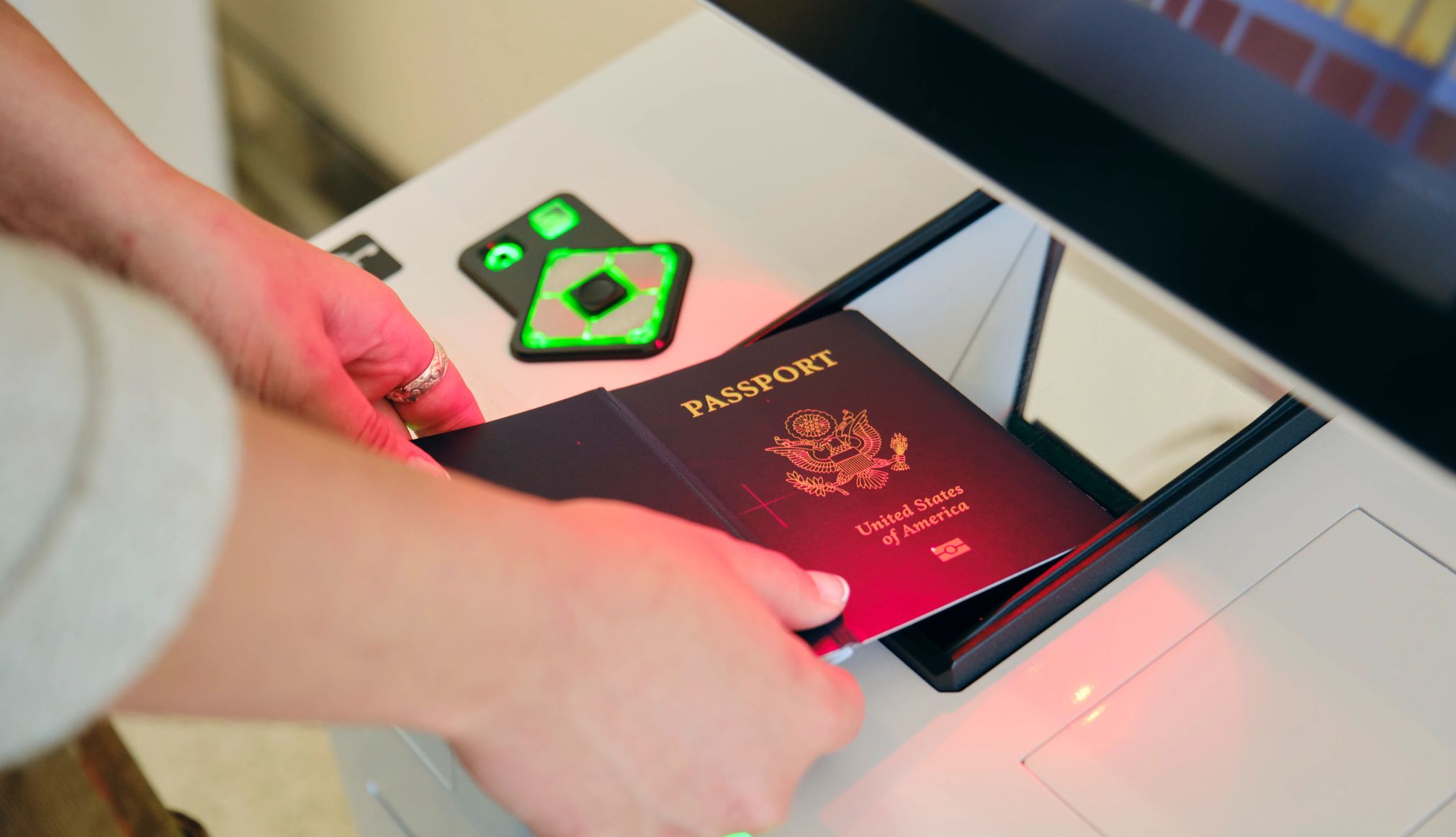























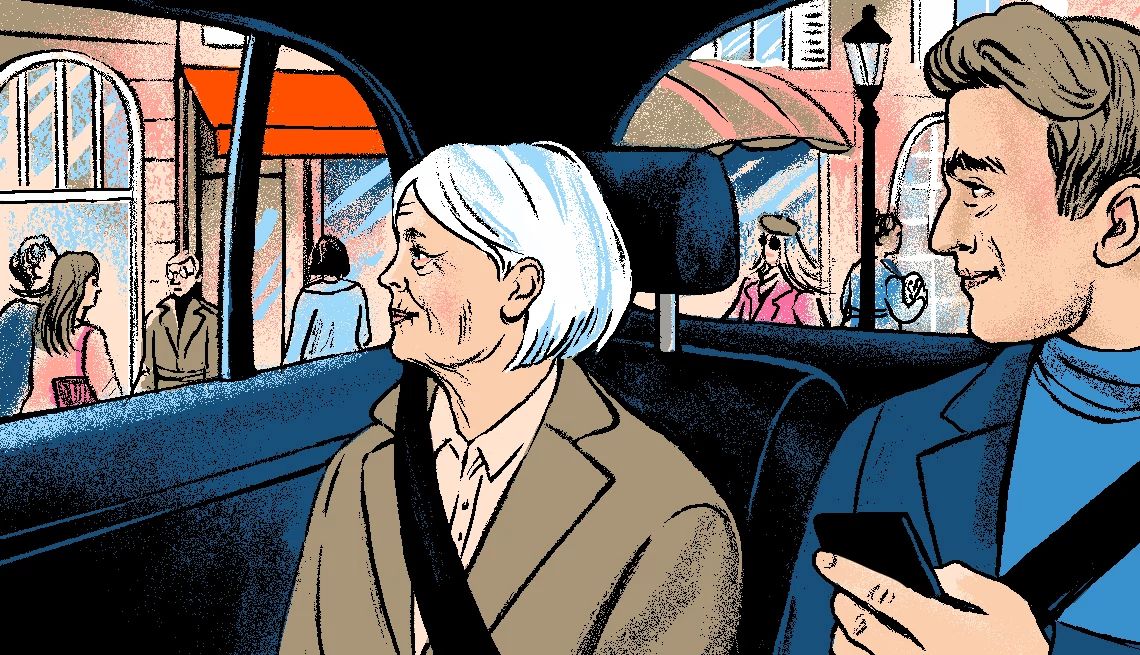
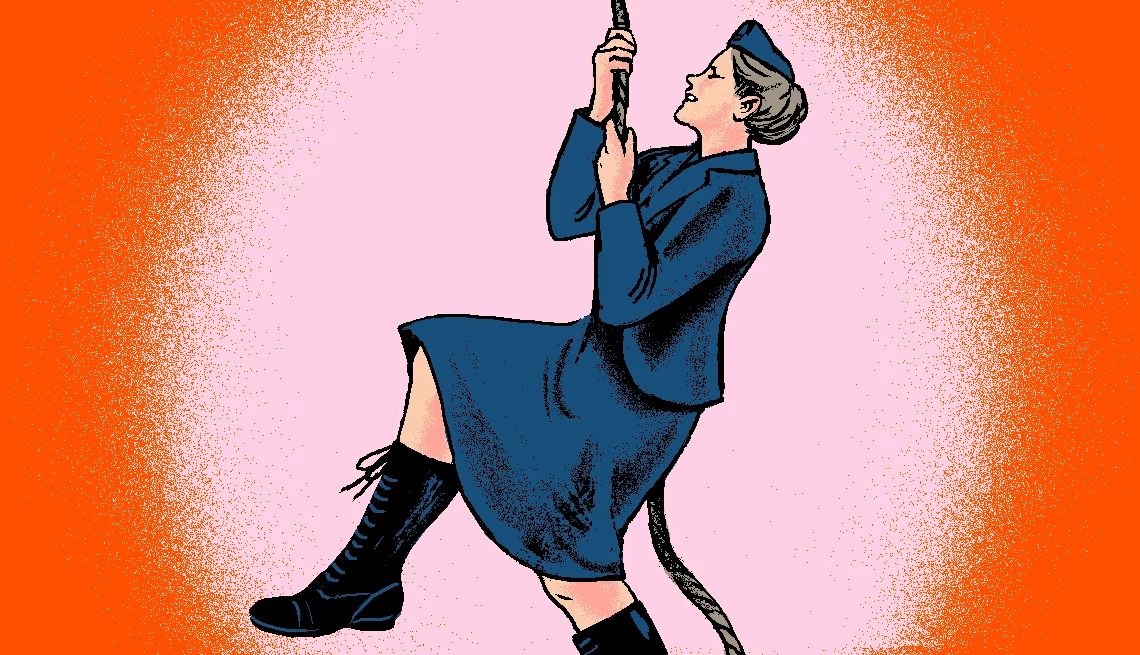
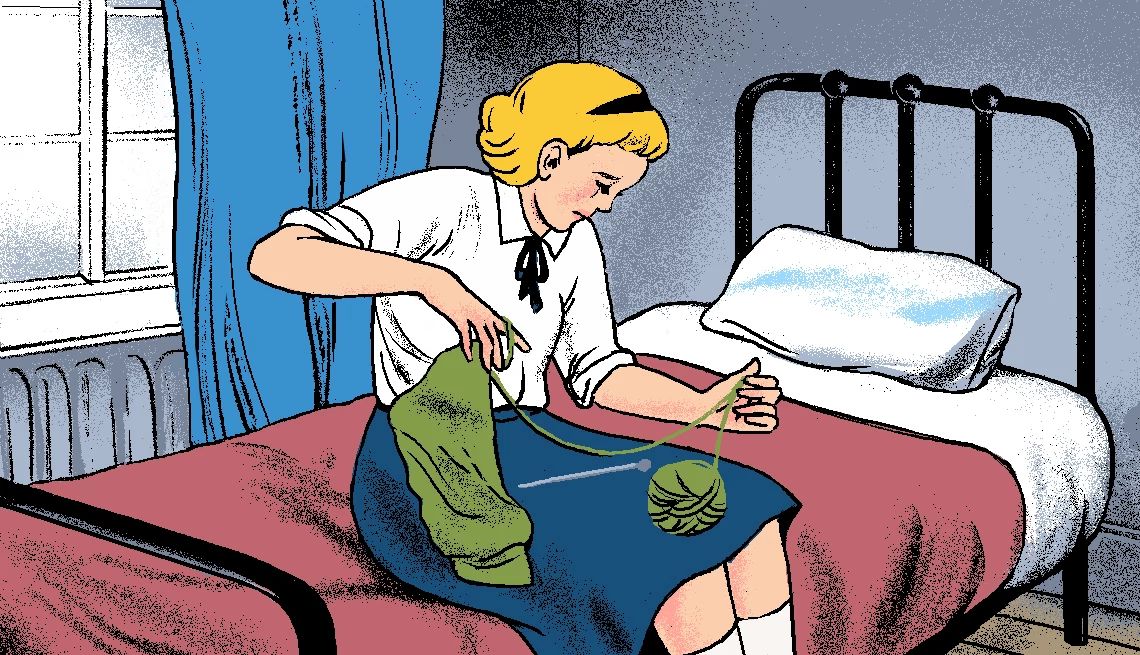
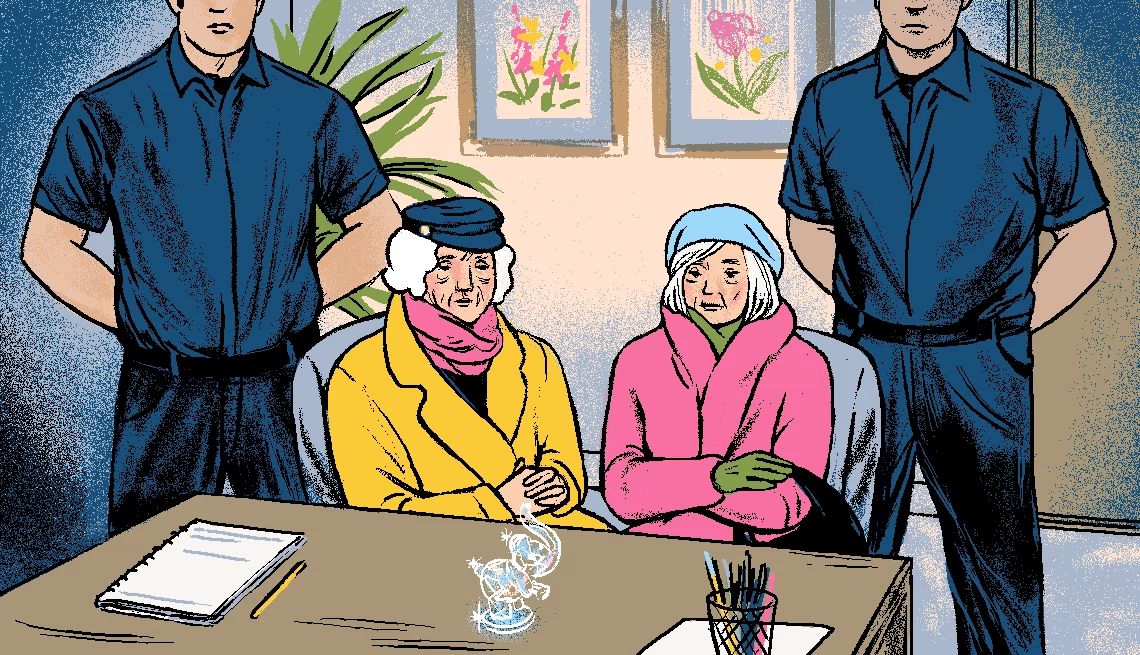
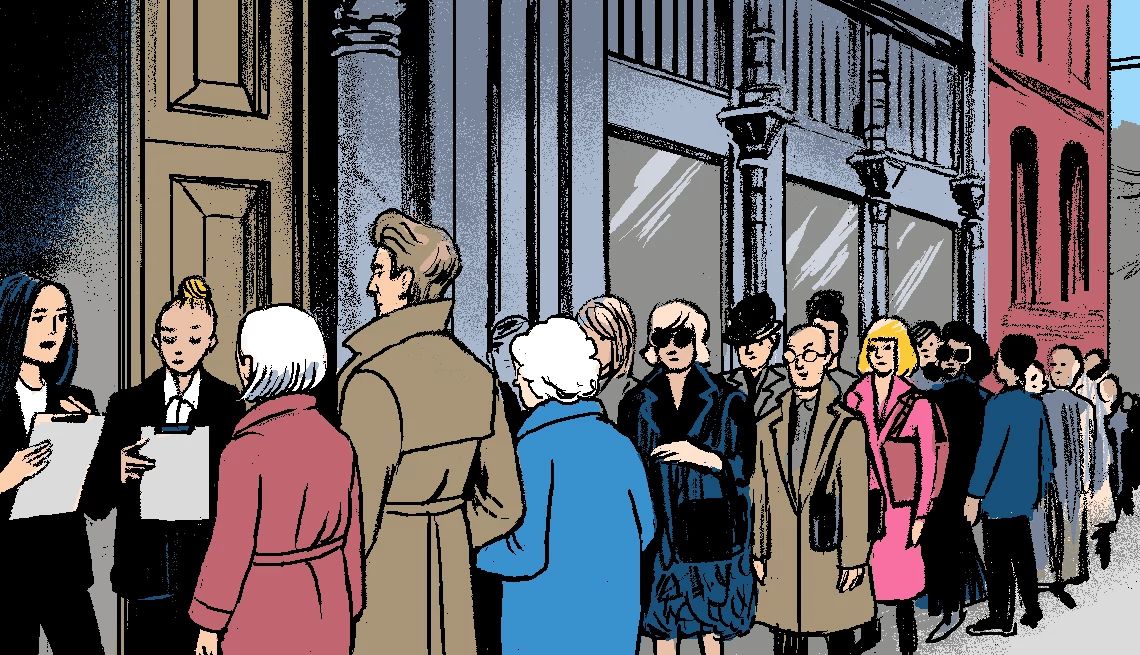
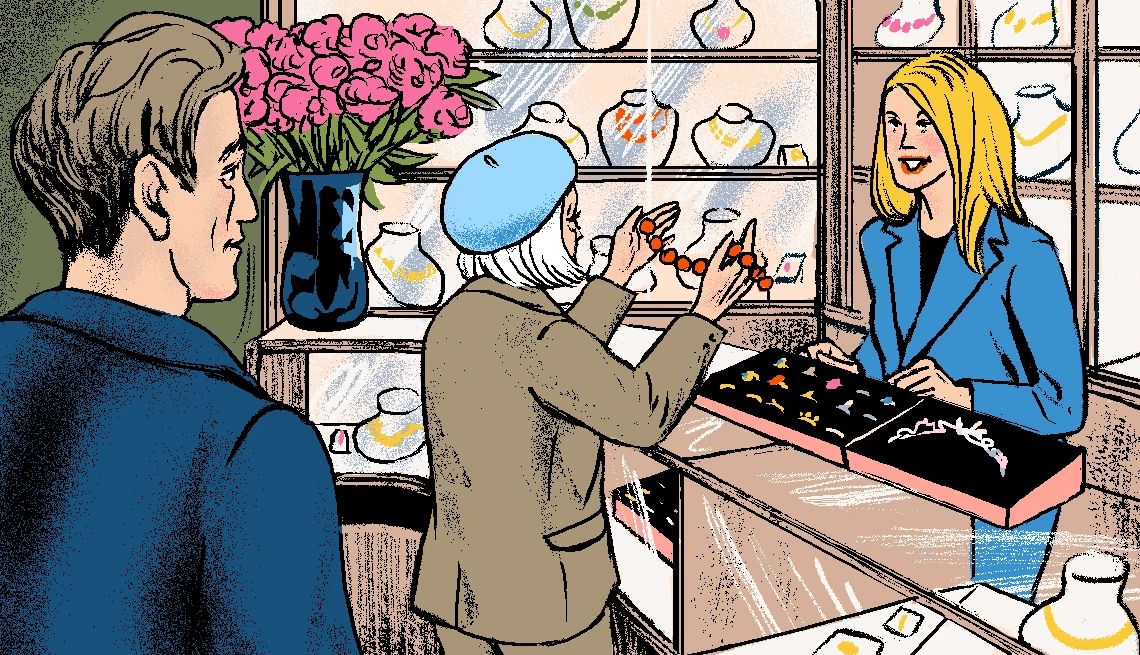
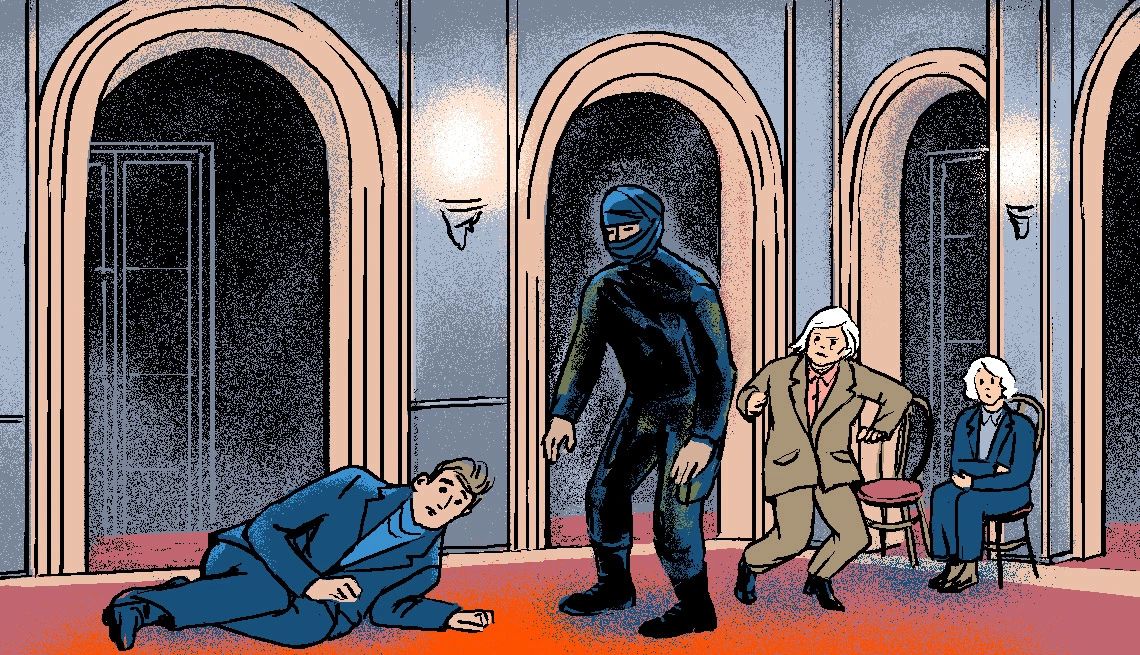
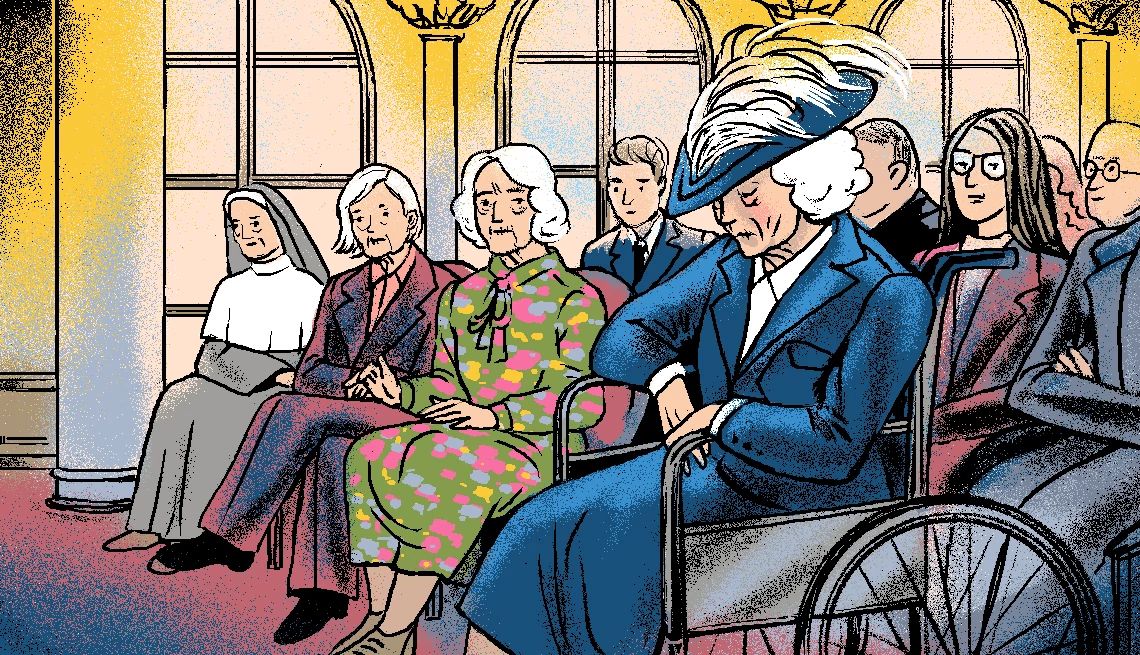




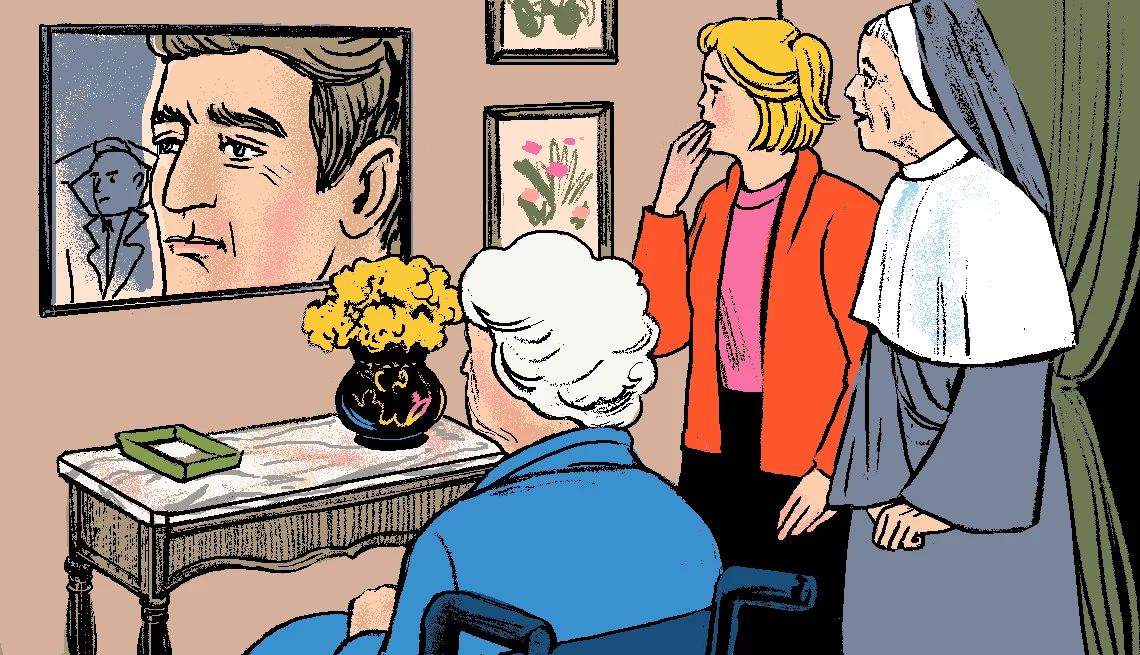
You Might Also Like
Meet ‘Excitements’ Author CJ Wray
This long-time romance writer was inspired to switch genres by real-life sisters still having adventures in their 90s
Free: James Patterson's Novella ‘Chase’
When a man falls to his death, it looks like a suicide, but Detective Bennett finds evidence suggesting otherwise
More Free Books Online
Check out our growing library of gripping mysteries and other novels by popular authors available in their entirety
More Members Only Access
Enjoy special content just for AARP members, including full-length films and books, AARP Smart Guides, celebrity Q&As, quizzes, tutorials and classes
Recommended for You